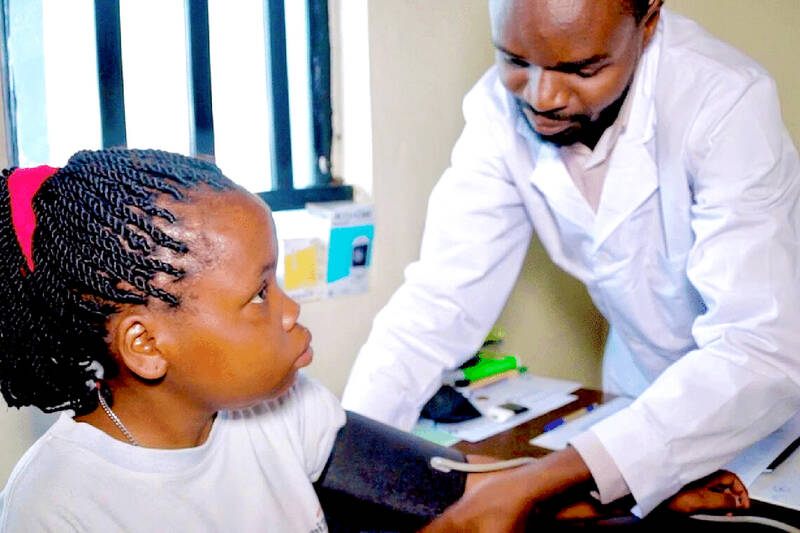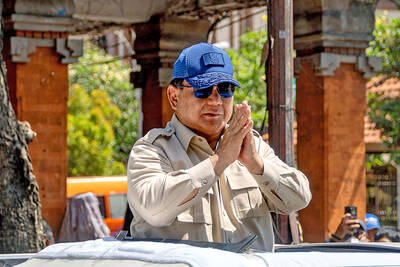Almost two decades after David Phillips noticed a disturbing trend of young, lean people who were undernourished as children showing up at clinics in northern Ethiopia with diabetes, the unusual form of the disease is finally getting a name.
Type 5 diabetes affects about 25 million people, mostly in poorer countries, and has been neglected and under-researched, a group of experts wrote in The Lancet Global Health yesterday, calling for the development of diagnostic criteria and treatment guidelines.
The patients’ profile is so unusual that, in a country short on healthcare resources such as Ethiopia, “there are people who die in a corner of their house because nobody ever thought about them having diabetes,” said Phillips, an emeritus professor at the University of Southampton’s MRC Lifecourse Epidemiology Center.

Photo: Reuters
Phillips first delved into the topic in 2008, when he spent time at diabetic clinics in rural locations in northern Ethiopia. He and colleague Liz Trimble of Queen’s University Belfast teamed up with local diabetologist Shitaye Alemu Balcha to study patients who did nit fit the diabetes parameters seen elsewhere.
Diabetes is booming across the globe, but most cases are so-called type 2, in which sedentary lifestyles and excess weight cause the pancreas to become resistant to insulin and eventually struggle to produce enough of the hormone.
The patients Phillips saw instead were often lean 30-year-olds from poor communities with a history of a severe lack of food as a fetus or in critical early childhood.
The WHO in 1985 called the disease malnutrition-related diabetes, before scrapping the name in 1999 amid disagreement over the role played by the lack of nutrition.
The diabetes community must “formally recognize this neglected entity, which likely affects the quality and length of life of millions of people worldwide,” experts led by Pradnyashree Wadivkar of the Albert Einstein College of Medicine’s Global Diabetes Institute in New York and Felix Jebasingh of the Christian Medical College’s department of endocrinology, diabetes and metabolism in Vellore, India, wrote in the opinion piece.
The proposal was backed by more than 30 scientists, including Phillips, after a meeting in Vellore, India, earlier this year.
Most people with type 5 diabetes live in countries that have strained healthcare systems.

DEADLOCK: Putin has vowed to continue fighting unless Ukraine cedes more land, while talks have been paused with no immediate results expected, the Kremlin said Russia on Friday said that peace talks with Kyiv were on “pause” as Ukrainian President Volodymyr Zelenskiy warned that Russian President Vladimir Putin still wanted to capture the whole of Ukraine. Meanwhile, US President Donald Trump said that he was running out of patience with Putin, and the NATO alliance said it would bolster its eastern front after Russian drones were shot down in Polish airspace this week. The latest blow to faltering diplomacy came as Russia’s army staged major military drills with its key ally Belarus. Despite Trump forcing the warring sides to hold direct talks and hosting Putin in Alaska, there

North Korea has executed people for watching or distributing foreign television shows, including popular South Korean dramas, as part of an intensifying crackdown on personal freedoms, a UN human rights report said on Friday. Surveillance has grown more pervasive since 2014 with the help of new technologies, while punishments have become harsher — including the introduction of the death penalty for offences such as sharing foreign TV dramas, the report said. The curbs make North Korea the most restrictive country in the world, said the 14-page UN report, which was based on interviews with more than 300 witnesses and victims who had

COMFORT WOMEN CLASH: Japan has strongly rejected South Korean court rulings ordering the government to provide reparations to Korean victims of sexual slavery The Japanese government yesterday defended its stance on wartime sexual slavery and described South Korean court rulings ordering Japanese compensation as violations of international law, after UN investigators criticized Tokyo for failing to ensure truth-finding and reparations for the victims. In its own response to UN human rights rapporteurs, South Korea called on Japan to “squarely face up to our painful history” and cited how Tokyo’s refusal to comply with court orders have denied the victims payment. The statements underscored how the two Asian US allies still hold key differences on the issue, even as they pause their on-and-off disputes over historical

CONSOLIDATION: The Indonesian president has used the moment to replace figures from former president Jokowi’s tenure with loyal allies In removing Indonesia’s finance minister and U-turning on protester demands, the leader of Southeast Asia’s biggest economy is scrambling to restore public trust while seizing a chance to install loyalists after deadly riots last month, experts say. Demonstrations that were sparked by low wages, unemployment and anger over lawmakers’ lavish perks grew after footage spread of a paramilitary police vehicle running over a delivery motorcycle driver. The ensuing riots, which rights groups say left at least 10 dead and hundreds detained, were the biggest of Indonesian President Prabowo Subianto’s term, and the ex-general is now calling on the public to restore their